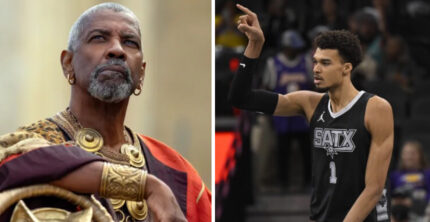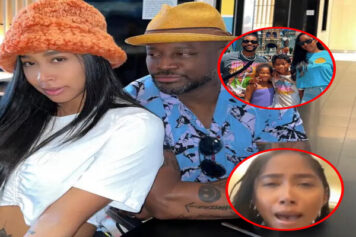Rapper Stak5 is the godfather of Secret Society Entertainment, but he’s more infamously known as Stephen Jackson—the NBA’s Kamikaze kid with the wet jumper. In a nutshell, Jackson’s one of the most feared, ferocious, honest, and clutch NBA performers of this generation.
He’s all about the grind. Before he ever got to the NBA in 2001 with the New Jersey Nets, he played in the CBA, Venezuela, Australia and the Dominican Republic.
In an era, where players are character chameleons with puppy muzzles in search of marketing dollars and fitting into a box that brings acclaim, favoritism and wealth to the “highly-marketable superstar,” Jackson has built a 14-year NBA championship career while maintaining his integrity as a person.
(It certainly hasn’t stopped his social media growth. As of September 21, 2019, Jackson has 335,000 followers on Instagram.)
He’s refused to cower to the pressures and control of big business. He’s often risked his own comfortable livelihood and health by staying true to his trill Port Arthur, Texas roots and the community and childhood friends that rode the wave of turmoil and tribulation with him.
Hip-hop has traditionally been an art form with a creative home base known as “the street element.”
The concept of gaining exorbitant wealth, flash and fame coming as a result of some early “struggle” followed by a mythical come up – whether it be hustling crack and coke or trying to carve out a pro career with a wicked J and some turbo booster ups – has become as integral a part of hip-hop’s creative process as poverty, guns and violence.
It’s rare that an artist really lives the hyperbole driven lifestyles that most rap actors portray. The 6-8 Jackson has managed to survive in the NBA, not only because he is a dogged worker and an immovable object (unless of course you are running him over with a car) with elite talent. But because he lives by a code of family first.
https://www.instagram.com/p/B2qWnRkl3KF/?utm_source=ig_web_copy_link
Port Arthur: The Pain & The Power
At the age of 15, Jackson saw his half-brother Donald Buckner die at 25-years-old as a result of a beating with pipes. Growing up in the housing projects of Texas was a challenge. But Jackson is a true American success story. He’s not ashamed of his humble beginnings or the bloodlines he shares with cats that don’t bounce basketballs, despite inflicting fullcourt presses and dishing their share of rocks.
Now, he’s inevitably moving into the final frontier of conquering the American Dream. His Secret Society record label, founded in the early 2000’s, is comprised of his ride-or-die, true trill brotherhood.
When Jackson was playing for the Pacers back in ’05 and still maturing as a person, he kept a red bandanna hanging outside his locker.
“You know what that is,” he told ESPN’s Michael Smith in a 2005 interview.
“Bloods. When he wasn’t running hoops, Jackson used to run with the local street gang. He says he represented the “3200 Block, Three-two-double-oh.” On the inside of his left forearm, he has a tattoo of a man firing an automatic weapon. He makes it clear he doesn’t “bang” anymore (he is, after all, a father of five), but he still represents his roots, only in a different fashion, emphasis on fashion. A shirt with a red collar, a red Pacers cap.
“I was just raised like that,” he says. “All my friends. I trip on nobody with no blue rag, but at the same time, it’s what I represent. It’s what I’ve represented since I was 9 years old. All my friends in my neighborhood. It was just inherited. I ain’t banging, though.”
If any NBA player is qualified to thug it out on wax. Jackson’s willingness to stand his ground, promote loyalty and comradery, his personal responsibility to uplift his peoples, reminds you of a young Tupac before he was deceived and lost faith in his fellow man.
In 2012, as a member of the OKC Thunder, Stak5 (then known as Stack Jack) dropped his first buzzing single, “Lonely At The Top,” featuring a 23-year-old scoring champion named Kevin Durant. The joint definitely has some knock and by NBA player standards, the duo is spitting fish grease.
Recently, the 36-year-old Jackson, who played nine games with the Clippers this season, released a rap song about disgraced Clippers owner Donald Sterling that evokes slavery and implores NBA commissioner Adam Silver to follow through on his promise to strip Sterling of his ownership privileges.
“America Da Beautiful (Letter To Mr. Sterling)” also references Dr. Martin Luther King, Jr., the Ku Klux Klan, cotton plantations, and lynchings in response to the controversy surrounding the former Clippers owner’s racist rants to mistress V. Stiviano.
In this exclusive interview, Stephen “Stak5” Jackson spoke with JR Gamble of The Shadow League about his new endeavors and what he hopes to accomplish through music.
Stak5: The Sterling song was something I needed to get off my chest. Something where I couldn’t make an impact the way I wanted to by not playing, so the next best thing I could do was to make a song. The song is crazy, I’m getting a lot of phone calls and great response from the song.
The first line is hard body and captures how intimately the subject matter affects him. Jackson evokes emotion and paints a vivid picture of how most of the disrespected NBA community feels about the disturbing TMZ-released audio.
“Dear Mr. Sterling here’s a speech for you…I had a dream the Clan had a sheet for you…”
“The best part of my career was being able to play with guys from different countries, different places, different races, that was the best part about it,” Jackson says during the song’s outro.
Stak5: Salute to Commissioner Silver for doing the right thing. But it ain’t over until [Sterling’s] family completely, completely sells the team…. The music thing was a long time coming. I have been doing it for some time now. I put out three mixtapes and they really took off. A lot of people say athletes can’t rap but by the minute I’m slowly killing that, so… It’s just my time. I have an album coming out and a lot of majors and independent labels are trying to get at me and work with me… So, at this point, it’s just me and my Secret Society family. All the hard work we put in. All the dues we done paid. It’s paying off. We kept God first and now it’s time for us to blow.
JR Gamble: You’ve played on a lot of teams, what state do you hold dearest to your heart? You won an NBA c’hip with Pop and them.
Stak5: RIP Pimp C, What up Bun? UGK the homey, home of the word ‘TRILL’, where it was born, where it originated. OG Spoonie G, the guy who made up the word. There’s only one place; Port Arthur, Texas where we from man, 45 minutes from Houston and 45 minutes from Louisiana. We right there in the middle on the water.
JR: Do you still want to play in the NBA and is there a playoff team you think you could be helping right now?
Stak5: Man that’s my first love. I always want to play basketball, but it’s got to be a situation where I can stand on my own two and speak my mind. I never want to overthrow a coach. I’m not the kind of guy that wants to go in there and coach the team, but at the same time if I feel like I’m being disrespected or if I feel like I’m better than the next person, I feel like I have a right to say so.
So If I’m in a position where I can go play, enjoy the game again and make some good money, then I would love too. That’s what I love to do and what’s blessed me to this point.
JR: Who do you think is going to take the NBA c’hip this year?
Stak5: I would say San Antonio always looks good. It’s hard to go against them because they’re ALWAYS around. Miami of course, LeBron you gotta go with him. OKC always gives San Antonio problems tho’, come the Western Conference Finals, even when I was on the team so…I say the Clippers also look good, but I see it being San Antonio and Miami again.
JR: How is today’s NBA different from the one when you started in?
Stak5: It’s soft…Yeah, I’ma cut you off. It’s soft. Watered down. Commercial. It’s not about who the best basketball player is or who wants to win the most. It’s not about that anymore. It’s about selling tickets and I understand it’s a business, but at the same time it should be about guys who want to win and not by making sure the guys on the commercials are winning the games. I’m not saying the games are fixed because a dude like LeBron James has won every game he’s won, he’s won it with his talents. Kevin Durant – every game he’s won, he’s won with his talents.
The NBA is definitely not fixed, but at the same time, you can’t say that the game is officiated or holds the same favor for a guy like Ron Artest as a superstar like Kobe Bryant. And as a player, you see that. So yeah, the game is soft man. It ain’t as physical as it used to be.
I mean, I came in the game when Johnny Newman and Kendall Gill and Charles Oakley were still playing in the NBA, so it was a different ball game. Every once in awhile the NBA needed a four-punch fight in the third quarter, you know what I’m sayin’?
The NBA needs that sometimes. It was good for the game. You had guys that were competing and really wanted to win and you could feel that from the TV, you didn’t have to be at the game. You could feel and see that passion. So yeah, the game has changed a lot (exhale), but I guess with time comes change.
JR: How did your spirited participation in the legendary Malice At The Palace shape public perception of you?
Stak5: You know what. At the end of the day, I ended up losing $3 million behind it so it affected that, but at the end of the day I couldn’t live with myself knowing I had my $3 million and one of my teammates was in the stands bleeding and getting jumped on and pummeled and I’m standing there watching.
I wasn’t raised that way. I remember in YMCA 4, 5 years old, you were taught if anybody knocks your teammate down, you have to knock them down. That’s how you were taught. I was raised like that, you know what I’m saying? Where anybody who I considered my brother, whether it be on a basketball court, in the grocery store, at Putt Putt, it don’t matter. If I’m with you and I consider you my brother and somebody offends you and we take it there, we are just going to deal with the consequences later.
And that’s just part of being a real friend. And when you’re in an arena with 50,000 people and it’s only 15 of us and four coaches and we have to defend ourselves from serious potential bodily harm, we don’t think about what’s going to happen later. You think about you and your teammates getting the hell up out of there and everybody being safe and you’ll deal with everything later. I don’t regret it at all.



